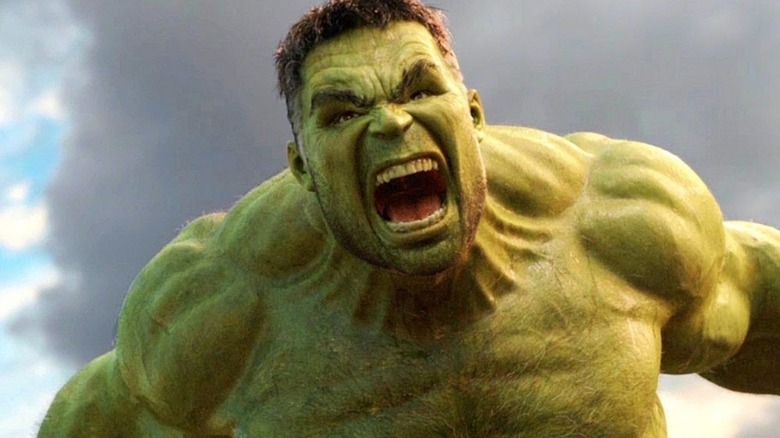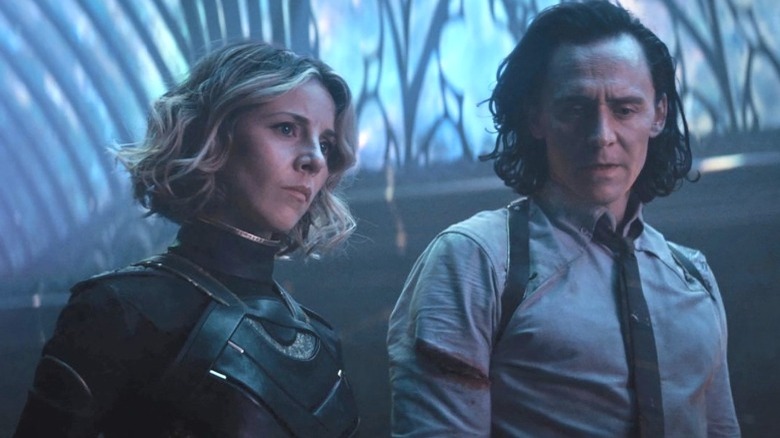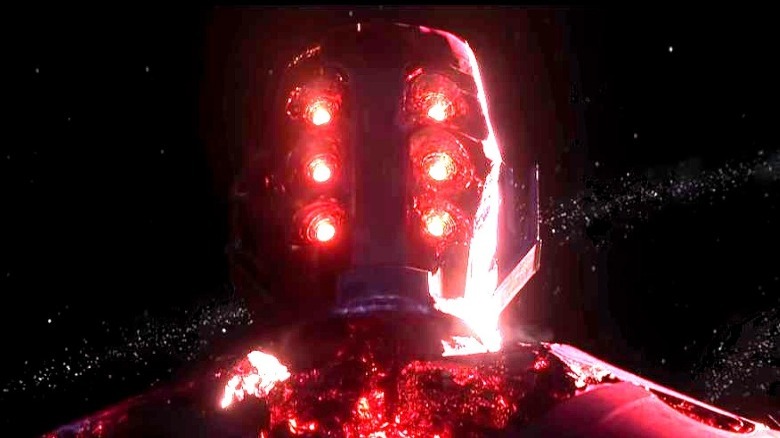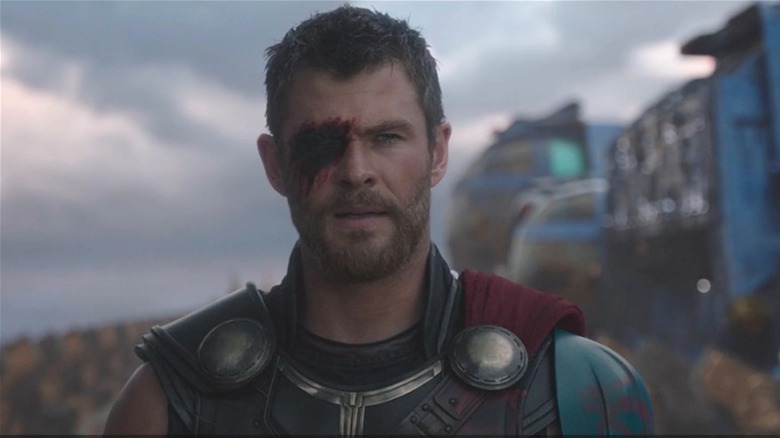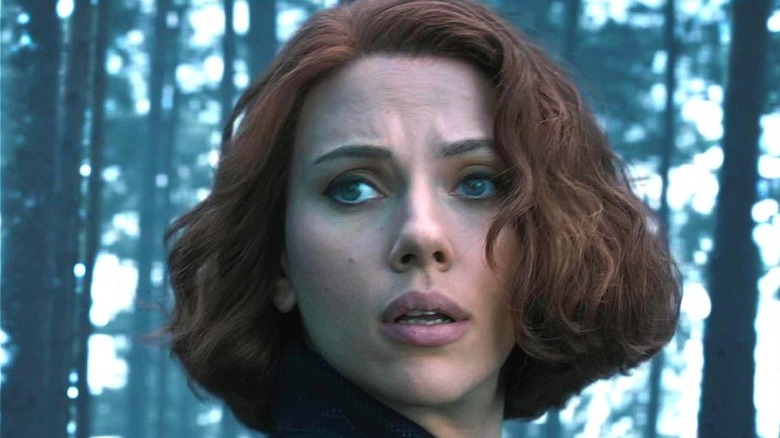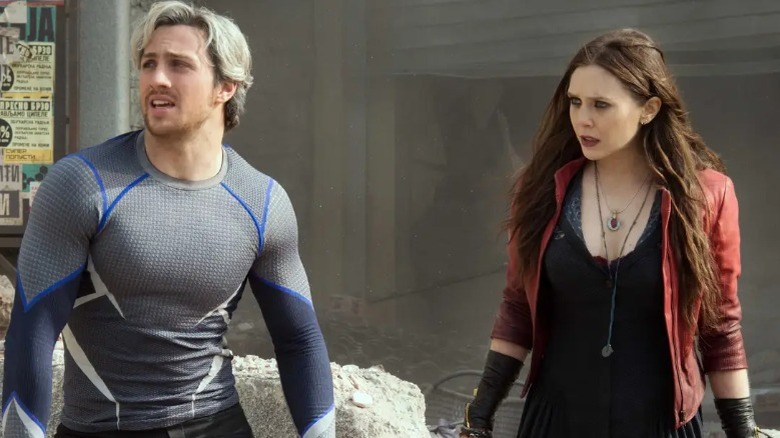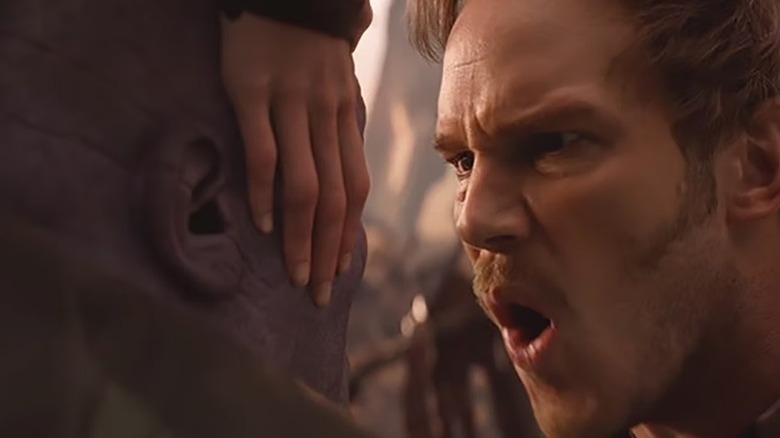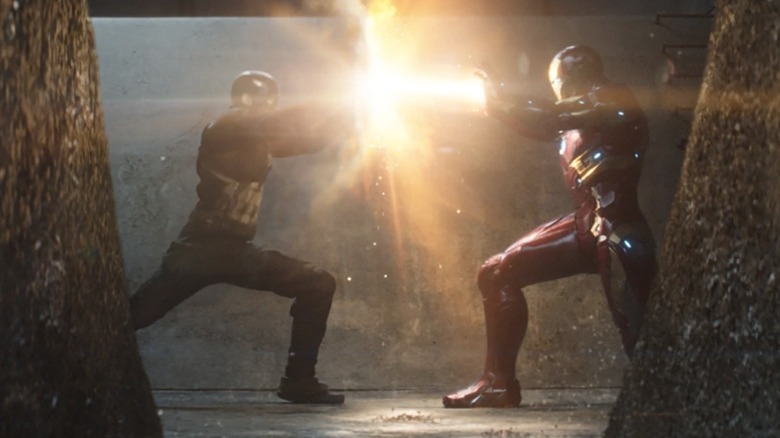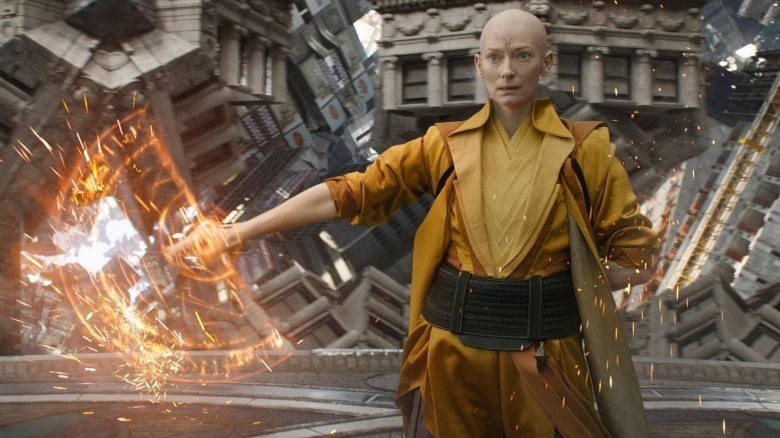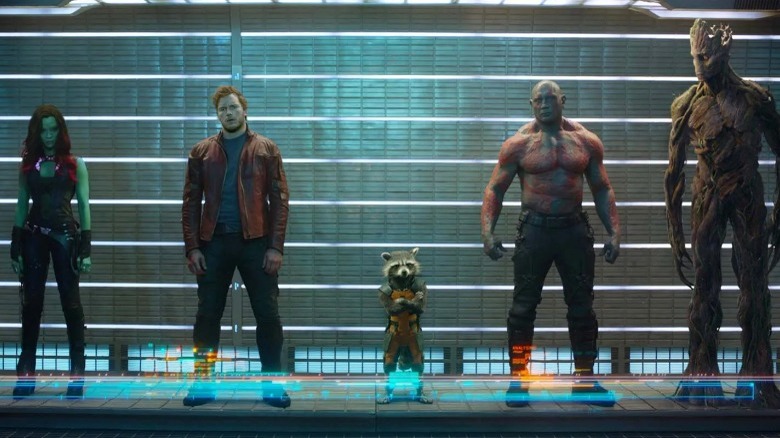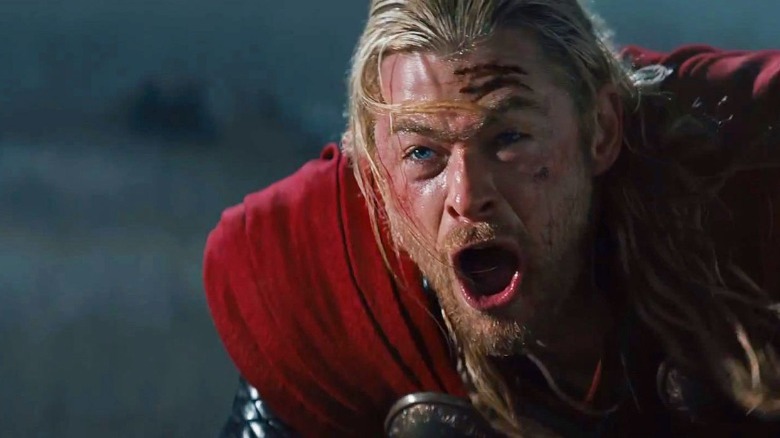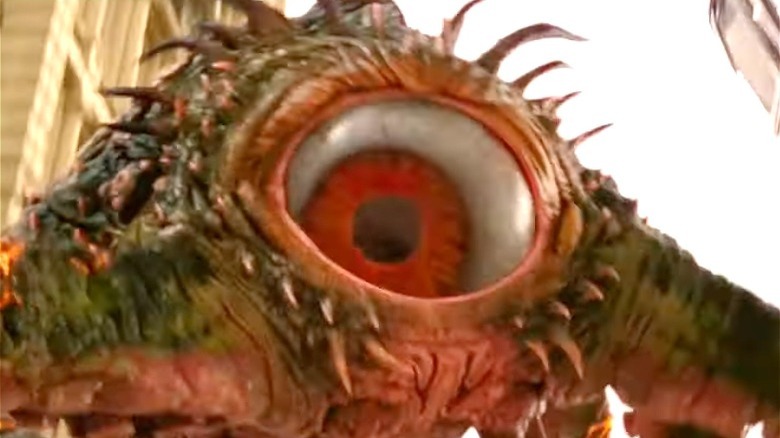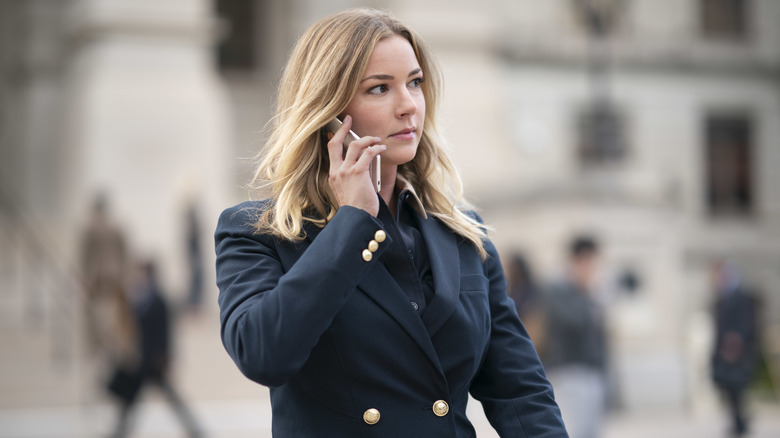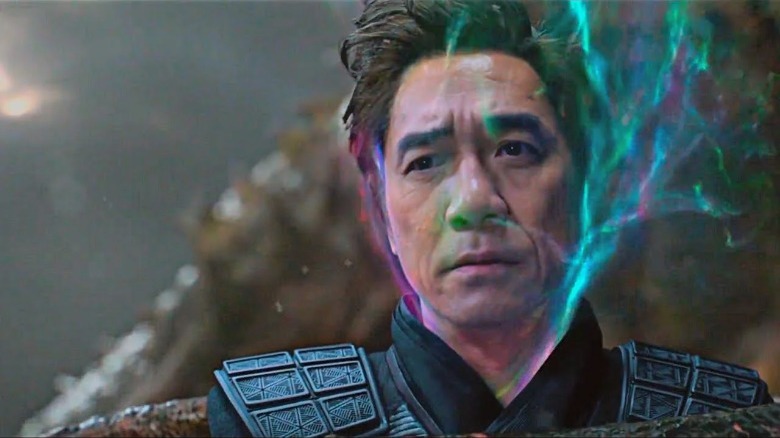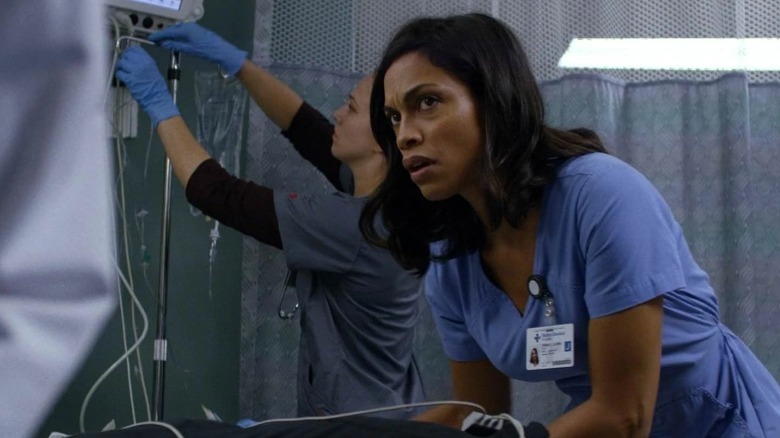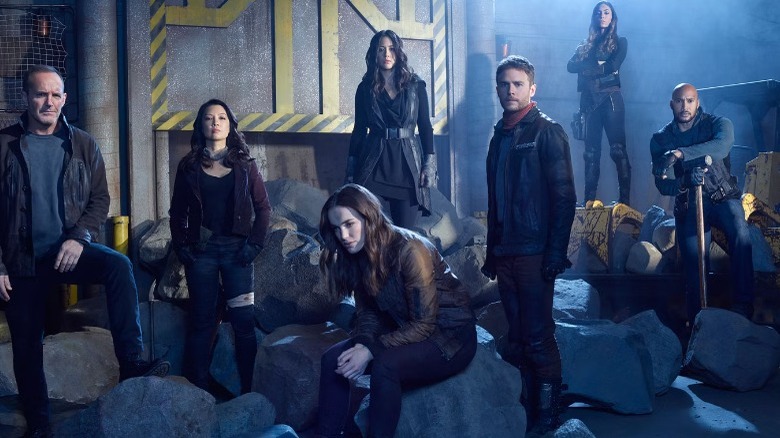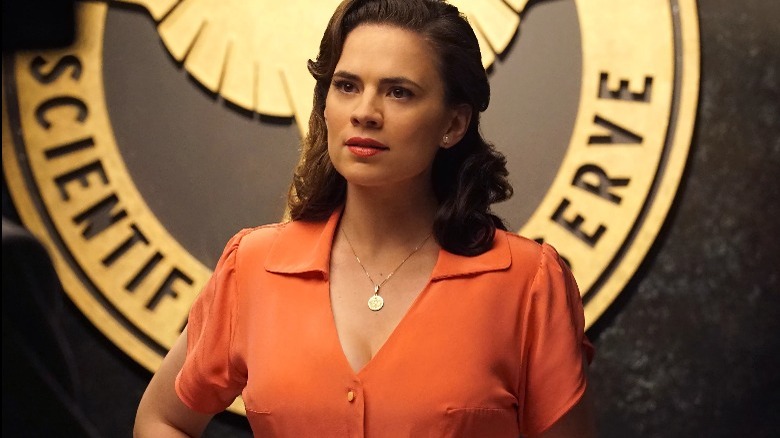MCU Franchise Moments That Still Make Us Angry
The bigger that the Marvel Cinematic Universe becomes, the more stumbling points we seem to find. The early phases still get the brunt of our criticisms, which makes sense, because that was when the franchise was still finding its way. Just look at the evolution of Thor Odinson. The most "out there" of the initial Avengers, Thor's MCU incarnation started out as a cool alien, with Asgard's gilded technology passing for magic. It wasn't until Taika Waititi's "Thor: Ragnarok" that he received a soft reboot and became the God of Thunder that comic fans know and love.
As it's gone on, the MCU's architects have become more confident that casual fans will accept the comics' weirder bits. However, with that confidence comes big changes, and a different kind of trouble: When a lot of people love something, it's not hard to find new sources of friction. While the MCU grows more fan-friendly with every new installment, these are the issues that we're still frustrated with. Thankfully, Marvel is in it for the long haul, and there's still tons of room for the MCU to grow beyond these infuriating moments.
Sylvie and Loki's kiss
In its first season, "Loki" gave us a naked God of Mischief, a zaddy Owen Wilson, Wunmi Mosaku in uniform, the rise of Kang the Conqueror, and our new king, Alligator Loki. However, it's the Loki variant Sylvie (Sophie di Martino) who caused the biggest stir. As much the protagonist of "Loki" as the title character (played once more, of course, by Tom Hiddleston), Sylvie is a Loki at heart, although she also borrows a number of character traits from a version of Amora the Enchantress known as Sylvie Lushton.
Sylvie is troubled and determined, and the trust between her and Loki slowly builds over the first season, eventually becoming a love that's as much about self-acceptance as it is romance. However, this relationship set off a flashpoint among the MCU fandom, with the faction that argued against it dredging up the fictional concept of "selfcest" to shut down other fans. By the time that Loki and Sylvie actually kissed, you could roast s'mores over Twitter. All of this, however, misses the point that Sylvie is a fantastic addition to the Marvel multiverse, and we're glad that she's returning for season two.
Chatty Celestials
Marvel's Celestials are bipedal eldritch abominations with few recognizably human features. In the comic books, they don't communicate much, either. They don't deign to talk to their mortal creations, and their primary method of communicating with the Eternals is via silent telepathy. That said, they can talk, and one, appropriately known as Tiamut the Communicator, presented itself as virtually human in a 2013 "Age of Apocalypse" event.
However, the moments when the Celestials talk are so rare that, when they occur, they're immensely powerful — what a Celestial has to say can change the course of an entire story. In "Eternals," though, Arishem the Judge is downright chatty. He never hesitates to speak to Sersi, and he has no issue scaring the pants off all of Earth and monologuing about his judgment to the whole galaxy. It makes sense in the context of the film, but for fans of the comics' cryptic, silently terrifying Celestials, it's a bit of a downgrade.
Thor's quick change act
"Thor: Ragnarok" reshaped Thor Odinson. No longer "just" an advanced alien, he's now wearing the title of God of Thunder loud and proud. First, he loses Mjolnir, which lets him realize that he already contains all the power he needs. Next, he loses an eyeball, only to see that the future of Asgard is his responsibility.
Five months after "Ragnarok" opened in theaters, Thor got a new eye and a new hammer during his paltry 14 minutes of screen time in "Avengers: Infinity War." By the time that 2022's "Thor: Love and Thunder" rolled around, he was back to craving Mjolnir. It's not that these are bad moves, plot-wise. It's that, by being rushed, they undo much of Thor's well-earned growth. It's okay for Thor to grieve for Mjolnir, but it's a development that comes out of left field. If there had been some dialogue that made Mjolnir a stand-in for everything that Thor has lost, that might've helped. Instead, these abrupt changes made "Love and Thunder" feel as divisive as "The Dark World."
Natasha's no monster
There's a lot to unpack about that scene between Bruce Banner and Natasha Romanoff in "Avengers: Age of Ultron." It's nice that their budding relationship is treated like something that's happened naturally offscreen, but their romantic dynamic, as presented, works better when the people involved live ordinary lives. An assassin and a green rage monster, dating? We have questions. Do they get bagel breakfasts? Can Nat still borrow her boyfriend's hoodie when it's been stretched out to size 12XL?
We will never get these answers. Meanwhile, fans are still fuming about the ugliest part of this scene: an exchange that fumbles Natasha's true feelings, and makes her call herself a monster because she can't have children. "Age of Ultron" Writer-director Joss Whedon explained in a Tumblr Q&A (via The A.V. Club) that Natasha's dialogue was meant to refer to the "murdery" part of being a Black Widow, but in the same sentence he says her infertility made her feel "unnatural." That's not better, sir. Years later, Joss' '90s-era brand of strong girl feminism continues to rot like a ham sandwich dropped on Arizona asphalt.
The Maximoff whitewash
Marvel Studios hadn't reacquired the film rights to the X-Men when "Age of Ultron" was in production, so it was understandable that the studio was initially cagey about Wanda and Pietro's origins. The twins are adopted, so their background is something that can always be retconned, and on the surface, the pair are recognizable as the characters from the comics. However, some big things are missing from their backstory, and their omission is a loss for diverse representation.
As the children of Magneto, Wanda and Pietro are Jewish and Romani by birth. There's no reason they can't be so in the MCU, too, as Eastern European countries, even fictional ones, contain thousands of post-war diaspora families. However, in "Civil War," Wanda has a Christian cross necklace hanging on her wall, and there's no sign that either Judaism or her Romani background matter at all in her life. As Romani viewers commented, this was made worse by "WandaVision," which reduced her comic-accurate Halloween costume to a cultural stereotype. On the bright side, these mistakes highlight the importance of the inclusivity seen in "Moon Knight" and "Ms. Marvel" and with the "X-Men" coming home, there's a chance we'll see Wanda's heritage revised.
Star-Lord's mistake matters
The loudest members of a fanbase aren't always the correct ones. When Tony Stark's plan to get the Infinity Gauntlet goes sideways in "Avengers: Infinity War," it's because Peter Quill bungles it. Frenzied by the revelation that Gamora is dead, Quill begins bashing Thanos so hard that it breaks Mantis' emotional control over the Mad Titan. Yes, this is the moment that puts Thanos back on course to victory. Yes, it was a bad decision on Quill's part. But mistakes aren't bad storytelling — they're important pieces of character development.
Peter Quill is a flawed guy with a big heart, and he'd long since given a slice of it to Gamora. He also isn't the most level-headed of dudes as it is — remember, he straight-up shot Ego the moment he found out some ugly truths. Yet, Quill's in-character mistake was blown out of proportion by fans who decreed him the worst and took to Chris Pratt's social media feeds to blame him for Thanos' victory. There is no circumstance that justifies harassing actors for the things their characters do. From a character perspective, Quill's actions make complete sense. Deal with it.
The Marvel Creative Committee's meddling
The early phases of the MCU were largely shaped by the Marvel Creative Committee. Long since disbanded, the group, which consisted of Marvel Comics creators and executives and answered to controversial Marvel CEO Ike Perlmutter, meddled in the movies so much that it led to a real civil war. Before it got to that point, however, the committee did major long-term damage to the franchise. Its most egregious sin? Sidelining characters like Black Widow and Gamora because Perlmutter believes that female action figures don't sell. Yes, to this guy, it's all about the merch.
But the committee's antics didn't go mainstream until talk started emerging about trouble over "Captain America: Civil War." From Perlmutter's agitating over the ballooning budget to a fight over an alternate ending that lost the emotional drama between Cap and Iron Man, this is ultimately when the architect of the MCU, Kevin Feige, went to Disney management and demanded to be freed from the committee's — and Perlmetter's — decrees. Fortunately for MCU fans, Feige won, and the MCU's only gotten better since.
The calamitous Ancient One
The Ancient One, the Tibetan sorcerer who served as Doctor Strange's mentor, was introduced by Stan Lee and Steve Ditko in the July 1963 issue of "Strange Tales." With him came a grab bag of Orientalist stereotypes, including being the mystic Asian mentor to a white dude and his appearance, which included a racist eye design and flowy white facial hair. It's not great.
Marvel Studios had a chance to upgrade the depiction of the Ancient One with the premiere of "Doctor Strange." Unfortunately, the result is barely a sidegrade. Any performance by Tilda Swinton is a good one, of course, but reimagining the troubled Ancient One as an ageless white woman upset pretty much everyone. Tibetans lost a chance for nuanced on-screen representation. China was put in the crosshairs due to C. Robert Cargill's allegations that the changes were made so that the film could be marketed in that country. Fans were confused and upset, with some engaging in their usual crying about diversity. On the bright side, these mistakes paved the way for "Shang-Chi" and its fantastic new version of Wenwu (Tony Leung).
James Gunn is fired
Despite being the ones who most often cry about cancel culture, it was the extreme right-wingers who dredged up the worst of Troma veteran James Gunn's social media posts, retaliating against the filmmaker for his anti-Trump rehetoric. There's no question that Gunn said some very offensive things, but he'd already apologized for his remarks. Still, within days of the old tweets going viral, Disney fired the director without bringing Kevin Feige into the discussions.
That left the third "Guardians of the Galaxy" film in limbo, with an unhappy cast and upset fans calling Disney to task for immediately caving to a politically-motivated echo chamber without considering the surrounding context. Good news quickly followed, however. Gunn signed on to reinvigorate the DC universe and in 2019, joint meetings between Gunn, Feige, and Disney president Alan Horn saw Gunn returnto the Marvel Cinematic Universe to wrap up his "Guardians" saga. It was an ugly situation, but at least we got some great films and TV shows in its wake.
Losing Patty Jenkins
Everyone ranks the Marvel movies a little differently, but almost everybody agrees that "Thor: The Dark World" sits right near the bottom. It's not a terrible movie, but it's not exactly good, either. Loki and Thor's angsty sibling rivalry is perfect, and Stellan Skarsgard's Dr. Selvig takes an enjoyable eccentric turn, but Malekith (Christopher Eccleston) is a waste of a villain, the plot is a muddle, and it's easy to get the vibe that Natalie Portman wasn't having a good time.
As it turns out, Portman was mad for a good reason. While director Alan Taylor ("Game of Thrones") does a competent job, "The Dark World" was meant for Patty Jenkins, a director Portman was eager to work with. Officially, Jenkins left the film over creative differences and remains on good terms with Marvel, but some reports indicate that the split wasn't as amicable as it appears. Jenkins' "Wonder Woman" shows that she has the vision to craft a fine Asgardian adventure, although that ship has probably sailed; for her part, Portman would depart the MCU until Taika Waititi convinced her to return for "Love and Thunder."
That's not Shuma-Gorath?
Early trailers for "Doctor Strange in the Multiverse of Madness" showed off a huge, tentacled beast wrecking the streets of New York. Accordingly, fans of Stephen Strange went wild, hoping that this was going to be the debut of Strange's longtime nemesis Shuma-Gorath, an eldritch horror inspired by Lovecraft. But then, leaked merchandise like T-shirts and LEGO kits started calling this gross cutie Gargantos. What was going on?
Gargantos is a minor Marvel character who looks suspiciously like Shuma-Gorath, and who's really only appeared in a couple of "Namor" comics. However, unlike Shuma-Gorath, his name isn't tangled in a web of licensing rights. See, Shuma is not Strange's problem alone. He's been in Capcom fighting games and comic books based on Robert E. Howard's "Conan the Barbarian" universe, and that seems to be where the problem lies. The "Conan" rights belong to a subsidiary of the video game company Funcom, which means that Shuma-Gorath was a legal no-go on the big screen. At least we can still pretend the multiversal tentacles seen in the first season of "What If...?" are attached to the big guy, at least until proven otherwise.
Sharon Carter, baddie?
Sharon Carter has a powerful legacy. Niece and heir to SHIELD's founding director, Peggy Carter, Sharon's a talented secret agent with an honorable streak that matches Steve Rogers' own. But Sharon's world falls apart after "Captain America: Civil War"; she's branded an enemy by the nation she's dedicated her life to simply because she helped Steve. Later, "The Falcon and the Winter Soldier" puts the titular pair on the tail of a rebellious super-soldier outfit funded by the mysterious and anonymous Power Broker. Any guesses who she really is?
The reveal that the Power Broker is Sharon Carter belongs to the audience alone. The "Falcon and the Winter Soldier" finale sees Sharon welcomed back to America, even while she prepares to sell the government's secrets. It's a twist that didn't sit well with many viewers. Sharon has every right to be angry about her treatment, but making her a traitor is a nasty subversion of who the Carter family is, and why they mean so much to Marvel fans. That said, with "Secret Invasion" on the horizon, maybe the Power Broker is actually a Skrull and the real Sharon Carter can be redeemed. Here's hoping.
Marvel's villains keep dying
The MCU keeps killing off its villains before they get a chance to shine. There are only two exceptions to this rule: Thanos and Loki, both of whom grew into nuanced characters and undeniable fan-favorites. All the rest get cut down, and with their deaths we also lose potential storylines that could've given these characters the same kind of complexity, ultimately deepening the Marvel Universe.
Killmonger, who had a point in his critique of Wakanda? Dead. Ultron, a recurring comic villain who's nearly as feared as Thanos? A one-and-done. Malekith, Kaecilious, the Black Order, and Ronan the Accuser, all classic comic mainstays? Tossed to the side. At least Wenwu, played by the incomparable Tony Leung, got an emotional sendoff.
What the hell is Marvel thinking? At least "What If...?" brought Michael B. Jordan back to revisit Killmonger, and gave Ultron the chance to nearly claim victory over all that our Watcher surveyed. With the multiverse torn open, there's a chance that some of these villains might return to the spotlight. That would be a good thing — many of them deserve another look.
The Night Nurse in everything but name
The Christine Palmer who we meet in "Doctor Strange" is a terrific character, played with depth and care by Rachel McAdams, but her comic book counterpart, the Night Nurse, gets more to do. In the comics, the Nurse is a discreet medic who exclusively treats injured superheroes. In the MCU, the character who's actually doing this job is Claire Temple (Rosario Dawson), and she doesn't get the credit she deserves for it.
It's a change that happened on purpose. In 2017, "Daredevil" showrunner Steven DeKnight explained that Rosario Dawson had, in fact, been cast as the Night Nurse. However, Marvel Studios said no, and the Night Nurse became Claire Temple, a minor "Luke Cage" character who served as the Defenders' de facto secret medic. With the Defenders returning and Rosario Dawson now a mainstay on Disney+, it's time to give Temple the respect she deserves.
The Agents of SHIELD travel through time and lose their way
Arguments about the canonicity of "Agents of SHIELD" aren't winnable. The series entered the multiverse before the MCU did, leaving countless doors open for its team's return, but the real problem with "Agents of SHIELD" is, arguably, how the series lost its way after season 4. That's the season that introduced Robbie Reyes (Gabriel Luna) as Ghost Rider, and then saw the agents locked in the nightmarish AI-controlled virtual reality known as the Framework. After that, the SHIELD agents are flung into an alternate future, where they're both the destroyers and heroes of a new Kree-controlled colony.
That's when everything changes. From that point on, the series sputters and never recovers, trapped in a tangled mess of time travel stories focused on the cryptic Chronicoms, the intergalactic Confederacy, and the multiple deaths and resurrections of Phil Coulson. While these stories are intriguing enough, these events turn a relatable outfit of mostly ordinary people into another generic superhero team, and abandon everything that made the series so quietly special.
Agent Carter canceled
From 2015 to 2016, ABC aired 18 episodes of "Agent Carter," a light post-war period thriller starring Hayley Atwell, and then canceled the whole thing, despite the second season ending on a cliffhanger. We're on the verge of discovering what happened to a presumed-dead Carter sibling when the show simply cuts to black forever. The only balm is the return of supporting cast member Daniel Souza (Enver Gjokal) in the final season of "Agents of SHIELD" and the rise of Captain Carter.
It's great that Atwell is still a recurring feature in the MCU, but "Agent Carter" was a terrific television program that was cut down in its prime. It's a show that tackled the hardships that single women, no matter their credentials, faced in the '40s. It addressed racial tensions. It could have done even more, but low viewership led to its demise, and Netflix, already the home of the Defenders, declined to rescue it. Today, "Agent Carter" is available to stream on Disney+, but we still don't know what actually happened to Michael Carter, and that sucks.
